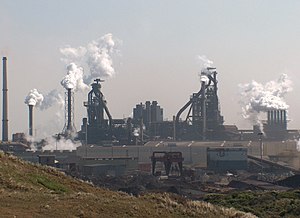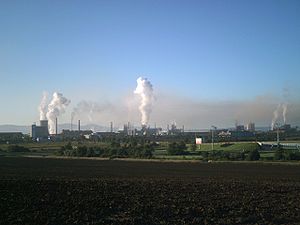
Back Ааглых хьанҭа AB صناعات ثقيلة Arabic Ağır sənaye AZ Тежка промишленост Bulgarian Indústria pesant Catalan Těžký průmysl Czech Sværindustri Danish Schwerindustrie German Βαριά βιομηχανία Greek Peza industrio EO


Heavy industry is an industry that involves one or more characteristics such as large and heavy products; large and heavy equipment and facilities (such as heavy equipment, large machine tools, huge buildings and large-scale infrastructure); or complex or numerous processes. Because of those factors, heavy industry involves higher capital intensity than light industry does, and is also often more heavily cyclical in investment and employment.
Though important to economic development and industrialization of economies, heavy industry can also have significant negative side effects: both local communities and workers frequently encounter health risks, heavy industries tend to produce byproducts that both pollute the air and water, and the industrial supply chain is often involved in other environmental justice issues from mining and transportation. Because of their intensity, heavy industries are also significant contributors to greenhouse gas emissions that cause climate change, and certain parts of the industries, especially high-heat processes used in metal working and cement production, are hard to decarbonize.[1] Industrial activities such as mining also results in pollution consisting of heavy metals. Heavy metals are very damaging to the environment because they cannot be chemically degraded.[2]
- ^ Gross, Samantha (2021-06-24). "The challenge of decarbonizing heavy industry". Brookings. Retrieved 2021-10-04.
- ^ Suman, Jachym; Uhlik, Ondrej; Viktorova, Jitka; Macek, Tomas (2018-10-16). "Phytoextraction of Heavy Metals: A Promising Tool for Clean-Up of Polluted Environment?". Frontiers in Plant Science. 9: 1476. doi:10.3389/fpls.2018.01476. ISSN 1664-462X. PMC 6232834. PMID 30459775.